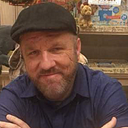‘Tea Time’: Writer/Director Tara Price Discusses Her Bloody New Short Film
During her afternoon tea party, a little girl — played by newcomer, Kennedy Barrie, loses her temper and things get…well, out of control.
The premise for award-winning writer/director Tara Price’s bloody new short comedy, “Tea Time,” can perhaps best be described as “Calvin and Hobbes meets Scarface.” A twisted mixture of childhood imagination and real-life consequence.
Ubiquitous in her storytelling, Price has an innate ability to weave a web of thrills and suspense while bringing out the best in her cast. No better example of this exists than the performance she yields from three-year-old Barrie, who is both insatiably cute and diabolically mean. Barrie’s real-life brother, Tripp, also appears in the film, giving even more visual impact to a short that already combines the best elements of comedy, horror and thrills.
Like her previous short film, “Earworm,” which featured Ernest Lee Thomas [“What’s Happening”], Price enlists the help of another beloved, multi-generational artist by involving wrestling legend Rob Van Dam to participate in a surprise twist.
“Tea Time” is already receiving buzz on the festival circuit, including being selected in the coveted 2020 Women In Comedy Festival presented by HBO. Proving that even though it’s only her sophomore directed film, Price’s star power continues to rise.
I recently spoke with Tara Price about “Tea Time” and more in this exclusive new interview.
What was the inspiration behind “Tea Time?”
Tara Price: I had been working on an outline for a feature about a child whose toys come to life in her dreams and wound up borrowing the idea to make something that was much more simple and fun. The overall idea of toys being alive in a child’s imagination isn’t new. I just ran with it in a weird direction. My one-sheet when I was seeking funding for “Tea Time” described it as “Calvin and Hobbes meets Scarface,” which amused me to pieces and I’ve since been told sums it up perfectly.
What’s your writing process like?
TP: When it comes to short films I have to know how it’s going to start and end before I even start fleshing out the idea. The ending doesn’t have to be tied up in a neat little bow but it has to have some kind of conclusion. I never write with a time frame in mind. I just want to write the idea and keep it interesting. Generally, you can estimate how many minutes the finished film will be based on the number of pages you write.
How did you discover Kennedy Barrie?
TP: Kennedy’s mom was actually a co-worker of mine. She’d recently moved to L.A. and had invited my husband and I to a housewarming party. When we arrived Kennedy answered the door all by herself, as if she were hosting the party. She gave us a tour of the home and by the end of the night she and her brother Tripp, who also appears in the film, were holding court. I was immediately taken with the dynamic between the two of them because that’s what I had written. I remember as we were leaving my husband turned to me and said, “I know what you’re thinking.” I laughed and said, “Is it that obvious?” The next day I brought the idea up to my co-worker and asked if she’d be ok with having her kids in the film. Luckily for me, it all worked out.
What was the filming process like?
TP: This was my first-time filming with someone so young so it was a bit unpredictable. Kennedy and her mom had practiced before we shot and her mom was there to feed her the lines. We also filmed with multiple cameras which was definitely the way to go. Because it wasn’t a studio project with investors I had to raise money privately and ask favors. I was fortunate to know so many people who love to work on passion projects like this. In the end, I have a film that looks great because it was done by pros.
How did Rob Van Dam get involved in this project?
TP: Rob’s a good friend of mine. In addition to wrestling he also does stand-up comedy, so after I wrote the script I emailed it to him to get his take and ask if he’d like to be involved. He really went out of his way to make time, which meant the world to me.
What’s next for “Tea Time?”
TP: With what’s going on with the pandemic right now we’re kind of in a holding pattern. The film had already been accepted into festivals before the pandemic hit, including the Women in Comedy Festival presented by HBO. They only choose fifteen short films and will announce the winners at a later date. The real joy of making a film is seeing it on the big screen and watching the audience’s reactions. We haven’t gotten to do that yet so it’s all bittersweet.
What satisfies you the most about the new film?
TP: That it all came together. I was so grateful to have such a hard-working post team; Jeff Britt [editor] in particular. He was very patient with me. I would pour through footage at home and then the two of us would sit down and work on it together. He was very patient and was very good at saying we’ll be done when we’re done. What I’m most looking forward to now is listening to people’s reactions. There’s always that feeling of nervousness you get about whether it will translate to an audience, but the thing that makes me proud is that I made the film I wanted to make.
